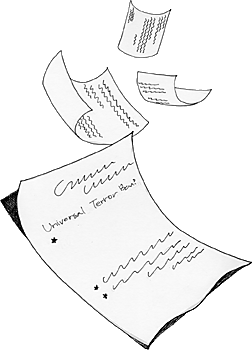
Illustration by Jennifer Kearney
|
|
By Michael Huston
Arizona Daily Wildcat
Wednesday, November 9, 2005
Print this
The Bush administration and Sen. John McCain are like a couple of co-workers who have been through a bad breakup but still have to work together amicably in the same office building.
Although both parties have contended on numerous occasions that their ties with one another are friendly and strong, the two have often butted heads, and the history behind the relationship is full of the sort of drama that should be reserved for another utterly mindless, yet helplessly captivating, episode of "Laguna Beach."
But as the senator and the White House presently find themselves in disagreement over the delicate issue of torture, McCain would do well to maintain his firm opposition to the abuse of American detainees.
John Kerry must have been left shaking his head in early 2004, finding out that the cross-aisle senator he had courted so tirelessly as a vice-presidential candidate had not only given him the "I think we're better as friends" treatment, but that McCain and his near-universal popularity would be traveling the country to support President Bush.
McCain, as a former prisoner of war in Vietnam and victim of torture himself, is the co-sponsor of a Senate provision that The Associated Press says would "ban the use of cruel, inhuman or degrading treatment against anyone in U.S. government custody." In other words, forcing captive terror suspects to watch episodes of "My Super Sweet 16" is no longer allowed.
The administration, led by Vice President Dick Cheney, has called for the Senate to write an exemption into that legislation that specifically allows the CIA to utilize torture in specially approved cases as a tool in the war on terror.
The logic of the vice president's position is easy to see: In a time when we are at war with terrorist enemies who seek to accomplish political change by killing civilians, isn't it acceptable in some special cases to torture a suspect to extract information, especially if that information has the potential to save lives?
The answer for many Americans who have never experienced torture firsthand is often yes. But for McCain, a man who knows what torture is because he was subjected to it personally, the answer is still no.
McCain maintains a desire for the provision to ban the use of torture by the U.S. government unequivocally, without the administration's desired exemption for the CIA. He explained his position by saying that the ban is necessary to improve our image in the world and send a clear message that the United States does not abuse its prisoners.
While Cheney's desire for a written exemption to the torture ban for CIA officials is understandable, it is important for the United States to take the lead in establishing a world without torture, not even for our enemies.
If the U.S.' best possible option for obtaining intelligence at any point is torturing a captive, then our intelligence is simply not as capable as it should be.
In a world where technology is advancing every day, the brave men and women of the CIA should be provided with the best possible tools to do their jobs, instead of being allowed to use archaic torture techniques.
Studies also indicate that information received from torture is generally less than accurate, as many victims end up saying whatever is necessary.
Amnesty International's Web site reports that "the lessons of history show that we cannot defeat insurrections, rebels and terrorism by resorting to torture," and that information extracted under torture is found later to be inaccurate up to 70 percent of the time.
The U.S. cannot write a fine print exemption into an otherwise dignified national statement and still expect the passed act to serve its desired purpose.
At a time when Congress and the nation are so bitterly divided along partisan lines, it is encouraging to see a noble Senate resolution, which passed by a vote of 90-9 on the floor but has not yet been sent to the president, experience support from both sides of the aisle.
If and when the bill does make it to the desk of President Bush, he should seize the opportunity to send a clear message to the world that the U.S. will not torture its enemies.
It is precisely our ability to recognize the dignity of human life, even in our enemies, that sets us apart from the terrorists with whom we find ourselves at war.
Michael Huston is a political science sophomore. He can be reached at letters@wildcat.arizona.edu.
